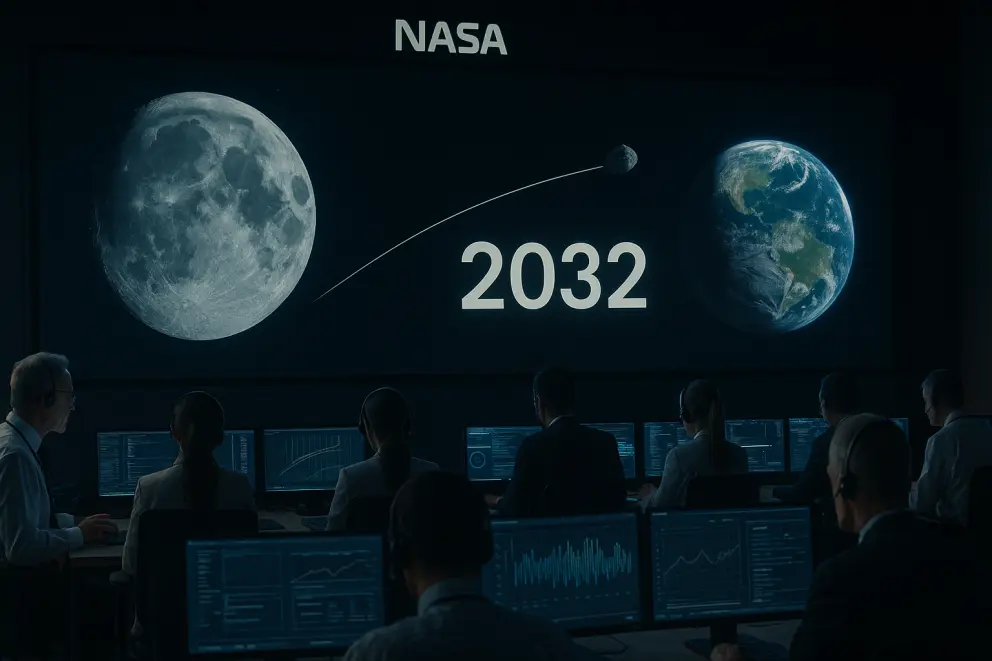Asteroid to Hit Moon in 2032? Scientists Respond
A small but headline-grabbing possibility has
astronomers talking: asteroid 2024 YR4 currently carries a non-zero
chance of striking the Moon on December 22, 2032. That probability is
small — roughly 4% by the latest orbital refinements — but it’s large
enough that scientists and space agencies are studying the object, modelling
potential effects, and even exploring whether an active defense would ever be
warranted.
2024 YR4 is a near-Earth asteroid first spotted in 2024. Follow-up
observations improved orbital predictions and nudged the odds of a lunar impact
from about 3.8% to roughly 4.3%. Importantly, those same observations have
ruled out a meaningful chance of an Earth impact in 2032.
Why the fluctuation? Early orbit estimates come with sizeable
uncertainties because the asteroid is small and faint; every new telescope
observation tightens where we expect it to be years from now. Because 2024 YR4
is currently far from Earth, astronomers won’t be able to gather more tracking
data until it returns into view (expected around 2028). That 4% estimate will
likely change — almost certainly down to near zero — or else resolve into a
definitive impact prediction.
An impact by a roughly 60-meter object wouldn’t shift the Moon’s orbit
or pose a global danger to Earth. But it could produce significant local
effects.
A high-speed impact
would create a fresh crater and vaporize some material at the strike site.
Depending on the angle
and speed, ejecta could be lofted into space. That material might threaten
satellites in Earth orbit or the increasingly busy cis-lunar space used by
communications and navigation platforms.
Some models show that large impacts on the
Moon can send material that eventually intersects Earth, possibly creating
spectacular meteor showers — though that outcome is not guaranteed.
In short: a lunar impact would be
scientifically interesting, possibly disruptive to satellites, and visually
dramatic in some scenarios — but not an extinction-level event.
Because the probability is small but non-zero, research groups have
started to model response options. These range from monitoring and further
observations to active intervention.
The conservative and typical path in
planetary defense is to acquire better observations (when the asteroid returns
to view) to shrink uncertainties and see whether the impact probability falls
to zero.
Some
researchers have explored more aggressive measures — including a hypothetical
mission to disrupt or fragment the asteroid well before 2032. Ideas include the
use of nuclear disruption or kinetic impactors. These proposals are
preliminary, controversial, and would require international coordination, legal
review, and significant engineering work long before 2032.
Most
planetary-defense experts emphasize that active missions are expensive and
technically complex. Until follow-up observations in 2028 produce a clearer
orbit, many teams favor continued observation and modeling rather than
committing to a mission.
The Moon is a much larger target in the sky than Earth-based telescopes’
error ranges might suggest. Even objects that no longer threaten Earth can
still land on the Moon.
· The Artemis program and other missions aim to put more humans and
hardware in cislunar space in the 2020s and 2030s; a new source of debris could
complicate those plans.
· The Moon can act as a natural laboratory: impacts teach
scientists about crater formation, lunar geology, and how small bodies interact
with larger worlds.
· Ejecta from the Moon can sometimes cross paths with Earth, creating
secondary phenomena that are of both scientific and public interest.
Short answer: reasonably confident that Earth is safe for 2032 from 2024
YR4, but watchful about lunar possibilities.
The headline-grabbing ’4% chance’ is real but conditional — it will
almost certainly shift as telescopes gather more data. History shows that
initial non-zero impact probabilities almost always decline to zero as orbit
solutions improve. The 2028 observing window is the critical checkpoint.
Astronomers expect the
asteroid to return to view around mid-2028; new tracking then will be decisive.
NASA and ESA planetary-defense teams will
continue to post orbit refinements and risk assessments as new observations
arrive.
Researchers are already
examining ejecta, satellite risk, and intervention feasibility — studies that
will shape whether the community moves from ’monitor’ to ’act.’
Conclusion
Asteroid 2024 YR4 is a small, distant space
rock with a small chance (~4%) of striking the Moon on Dec. 22,
2032. The possibility is intriguing and worth monitoring because of
potential effects on lunar surface science, satellites, and cislunar operations
— but it does not currently pose a threat to Earth.
Scientists will refine the orbit with more
observations (especially in 2028), and those refinements will most likely rule
out a lunar impact — or else confirm one early enough for realistic mitigation
planning. Until then, the best response is careful observation, modeling, and
international discussion about what to do if the odds climb.










